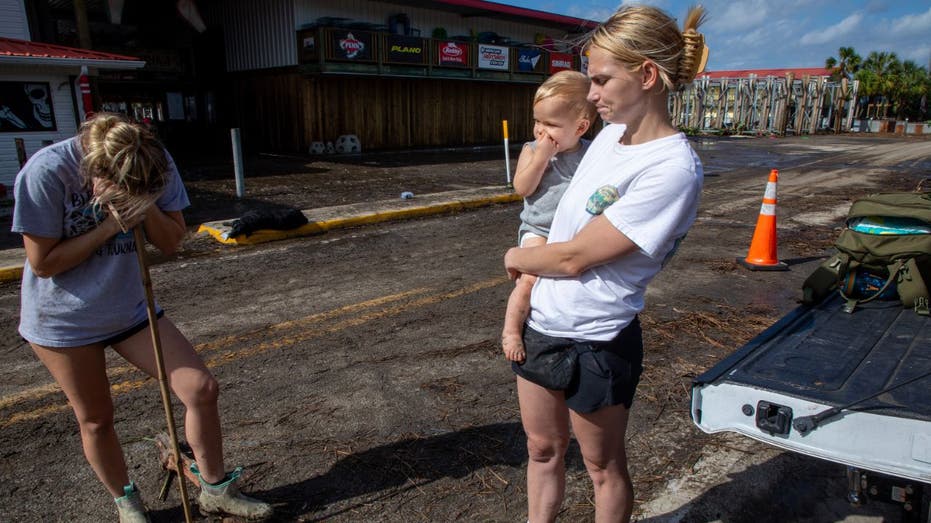US unemployment claims spike in wake of Hurricane Helene
Weekly jobless claims jump following Helene, with Hurricane Milton expected to have further impact
Hurricane Helene flooded major manufacturing facility responsible for 60% of country's IV fluid
FOX Business' Lydia Hu has more on the impact caused by Hurricane Helene's devastation on 'Varney & Co.'
The number of Americans filing for unemployment rose much more than expected last week, to the highest in 14 months, driven up in part by the impact of Hurricane Helene.
Economists say Hurricane Milton, which tore through Florida overnight, will likely have further impact on the jobs market in the short term.

Chaeli Harden, with her 1-year-old son, Kix, and Lori Medlin, left, stand outside the Sea Hag Marina in Steinhatchee, Florida, after Hurricane Helene passed through on Sept. 27. Storm surge from the Steinhatchee River destroyed several homes and busi (Ted Richardson/For The Washington Post via Getty Images / Getty Images)
Initial claims for state unemployment benefits increased 33,000 last week to a seasonally adjusted 258,000 for the week ended Oct. 5, the Labor Department said on Thursday.
INFLATION RISES 2.4% IN SEPTEMBER, ABOVE EXPECTATIONS
Economists polled by LSEG had forecast 230,000 claims for the latest week. There were large increases in unadjusted claims in North Carolina and Florida, two of the states that were the hardest hit when Helene devastated large swathes of the Southeast in late September. The storm's impact is likely to continue distorting claims data in the weeks ahead.

Roy's Restaurant worker searches through the rubble at the demolished eatery after Hurricane Helene landed in Steinhatchee, Florida, on Sept. 27. (Willie J. Allen Jr./Orlando Sentinel/Tribune News Service via Getty Images / Getty Images)
Helene brought devastating flooding and storm surge to the Southeast, killing at least 232 people and leaving a countless number displaced. Moody's RMS Event Response estimates the damage caused by the deadly storm puts losses in the U.S. private insurance market at between $8 billion and $14 billion.
HURRICANE MILTON HAMPERS GASOLINE SUPPLY CHAIN
Bill Adams, chief economist for Comerica Bank, predicts jobless claims will rise further in coming weeks due to the devastation from Milton.
He noted there is not traditional economic data yet on the storm's impact, but cited reports that 30% of electrical customers in Florida were without power as of Thursday morning — which will likely have an impact given the state accounts for 6% of U.S. GDP.
Recovery could have a long road ahead, says Nicole Maul
American Red Cross National spokesperson Nicole Maul details the impact and recovery following Hurricane Milton.
"Employment, retail sales, and industrial production typically fall in areas hit by severe weather, then rebound quickly as rebuilding starts," Adams wrote in a note reacting to the data on jobless claims.
GET FOX BUSINESS ON THE GO BY CLICKING HERE
"That means it will be harder to tell if the economy’s trend is changing in October and November, since monthly changes in upcoming data might be due to the storms or due to a change in the broader economy."
FOX Business' Eric Revell and Reuters contributed to this report.






















